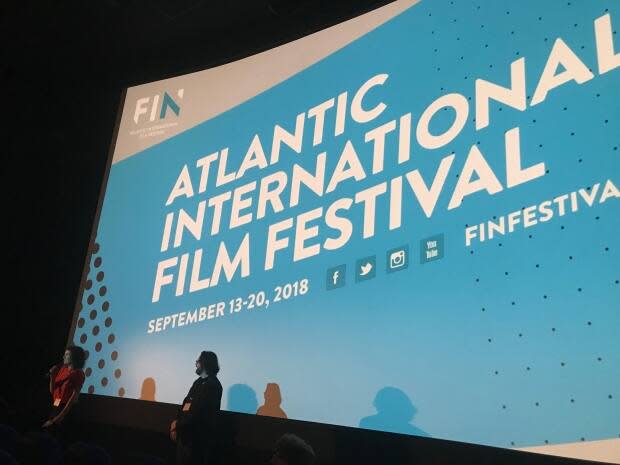Pandemic silver lining: N.S. film festivals go online, but report increased engagement
Many Nova Scotia film festivals that went online this fall due to COVID-19 have found a silver lining away from the silver screen with audience engagement surpassing previous years.
Lunenburg Doc Fest, which ran from Sept. 24-30, went online, expanding the number of days of the festival and the number of films shown from previous years. They were offered through a pay-what-you-can model.
That led to a 50 per cent increase in the number of full-festival passes sold, up from 300 to 450, and an increase in the aggregate audience by about 700, according to executive director Pamela Segger.
"We were able to really boost our younger age set in our region," she said. "We have an older audience, and that's fantastic because they are so engaged and eager, but because of the virtual nature and flexibility in the programming, and the broader, more diverse programming, that appealed to a younger set."
Segger also noted that 53 per cent of the audience this year attended the festival for the first time.
Geoblocking technology a plus
A big part of the streaming platform for film festivals — Lunenburg Doc Fest used one called Eventive — is that it can geoblock, or control the geographic region where the film is available to be streamed. That is estimated by the postal code and IP address of the ticket-buyer.
"We were able to offer about half of our feature-length documentaries and all of our short films across Canada," said Segger. "More than that, we offered programming to our U.S. audience."
Segger said 21 per cent of people were from outside Lunenburg County and elsewhere in Nova Scotia, according to audience surveys, while another 37 per cent of the audience was from outside the province.
"That is a big bump up, almost three times the figures from previous years," said Segger.
FIN saw uptick, too
Films showing at the FIN Atlantic International Film Festival, also online this year from Sept. 17-24, were geoblocked to Atlantic Canada only.
"We see ourselves as platforming Atlantic Canadian content, and it feels really good to champion [that] to the local audience," said Wayne Carter, executive director at FIN.

Even with a narrower target of possible viewers, FIN saw an increase of engagement with its audience this year.
"We saw pass sales were accelerating over single-ticket sales," said Carter, "Pass sales are a big thing for us because they speak to an engaged audience of people who want to partake of more than just one or two movies. Our pass numbers were probably up 70 per cent over last year."
He hesitates to estimate attendance numbers because, when a festival streams a movie, it's not as simple as counting bums in seats.
That is truly the silver lining behind the COVID cloud as far as film festivals go. - Wayne Carter, executive director of FIN
"Very few people are sitting there by themselves watching these films," said Carter. "It might be a couple, it could even potentially be a family or a group of friends."
He added, though, that from the post-festival survey, the audience response around questions of accessibility through the online platform was universally positive.
"We had a lot of people saying they attended the festival for the very first time," said Carter.
"That is truly the silver lining behind the COVID cloud as far as film festivals go. It allows us to position our festival to a broader audience, but more importantly reach people who couldn't get here in person."
Accessibility a struggle for many Nova Scotians
Some of the audience experiencing film festivals online for the first time could be Nova Scotians with disabilities.
Vicky Levack has cerebral palsy, and is an outspoken advocate for human rights. She said more people living with disabilities would engage with film festivals online, but only if it's affordable.
"If it's at a reasonable price point it would certainly open up for anybody struggling, which, unfortunately, is a lot of people with disabilities," said Levack.
"We have a lot to offer when you talk about art and creativity. We have to be creative in order to live in the world. The world is not designed for us, so we have to work around it. There's a lot of stories that need to be told, and art gives people with disabilities an opportunity to do that."

Segger and Carter are predicting their events will be partly in person and partly online in 2021, providing that the audience will by then be vaccinated and able to gather in crowds.
Michael Howell, founder and executive director of Devour: The Food Film Fest in Wolfville, held a hybrid festival this fall with a mix of online and in-person events.
Devour, which took place from Oct. 21-25, saw its audience grow outside of Nova Scotia, too.
"We did very, very well and sold almost an equal number of tickets virtually as we did in person," said Howell. "We were able to track sales as far away as Spain and across the country, in addition to people here in the Atlantic bubble who weren't able to travel."
He said the online platform not only attracted broader audiences from elsewhere, but is already proving to be useful for allowing high-profile guests to participate virtually.
"We had a workshop this year with Jason Priestley in Toronto and Bob Blumer in Los Angeles," said Howell.
"Now that we understand the technology, and they understand how to Zoom, they can participate without having to spare a week of their time to come to Nova Scotia."
MORE TOP STORIES

 Yahoo Finance
Yahoo Finance 